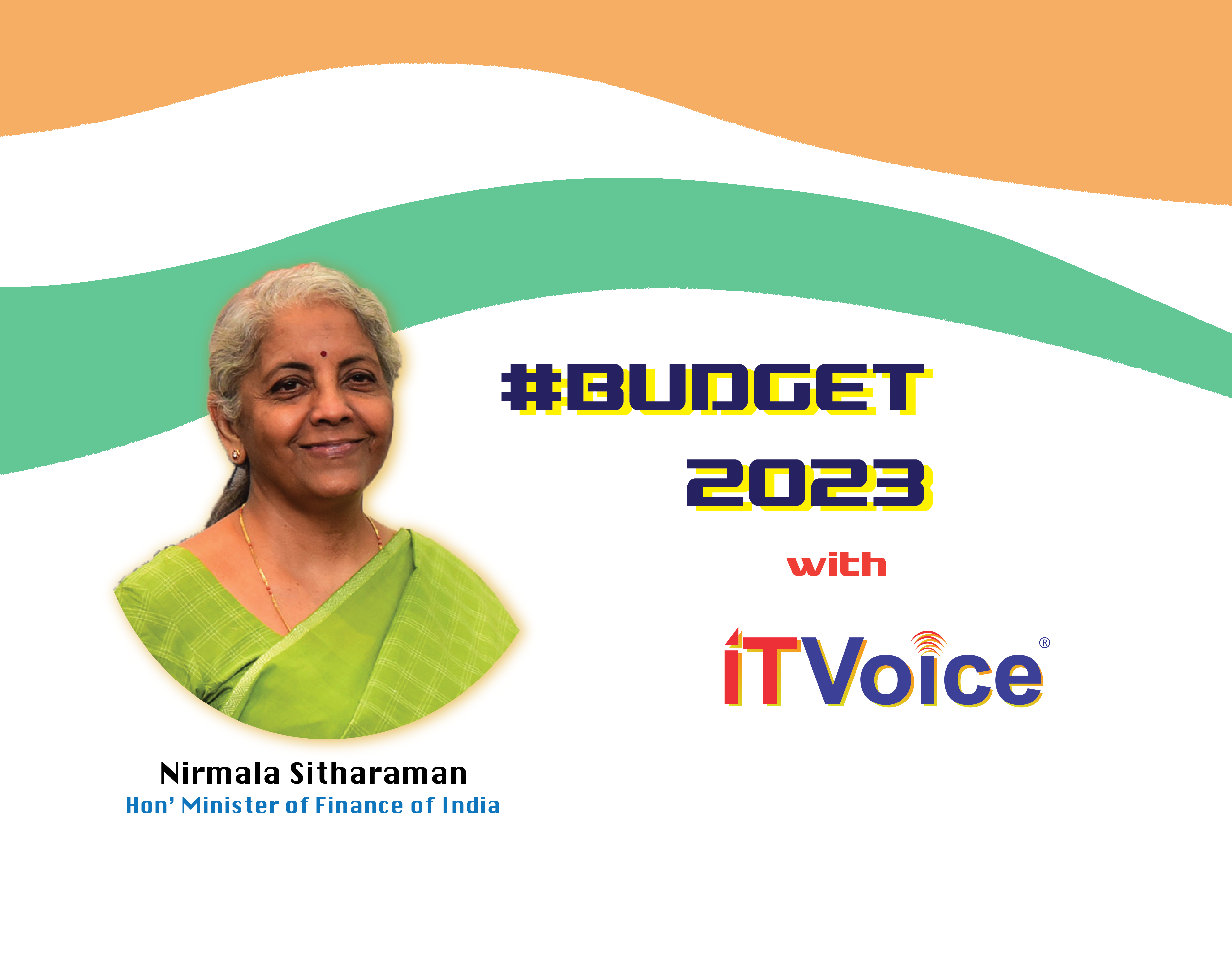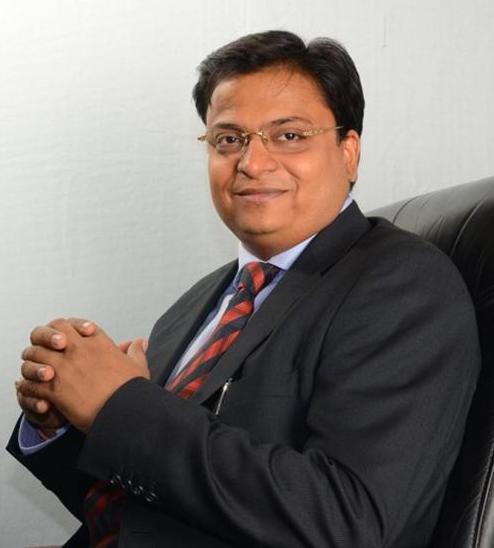Finance Minister Nirmala Sitharaman has just announced the Union Budget Proposals for FY23-24 (or the First budget of Amrit Kaal, as she called it) and we’re here to break down the major announcements from the FM’s speech.
We'll be posting #BudgetSession2023
Highlights.A Thread 🧵
— IT Voice Media (@itvoice) February 1, 2023
The FM mentioned that this Budget hopes to build on the foundation laid in the previous Budget and the blueprint drawn for India at 100. She mentioned that the EPFO numbers doubled to 27 crores. Interestingly, government is implementing a scheme to supply food grains from Jan 1, 2023, to all Antaodaya and priority households for the next 1 year.
The Finance Minister has stuck to the advance estimate for the current fiscal’s GDP growth of 7% while suggesting that India is a bright star in the world economy. The FM announced setting up of an agricultural accelerator fund to fund start-ups by entrepreneurs in rural areas to develop affordable and innovative solutions for challenges faced by farmers. The government has also initiated computerisation for 63,000 primary #agricultural credit societies with an investment of Rs 2,516 crore.
According to the finance minister, preparations are being made to establish a sizable decentralised storage capacity as well as a national cooperative database. Over the next five years, this will make it easier to establish cooperative societies for farming, dairy, and fishery in undeveloped villages. The FM declared that a national digital library for children and adolescents would be established to give kids all around the nation access to high-quality books.
Next up, the FM proposed to increase capital expenditure by 33% to Rs 10 lakh crore, which would be 3.3% of the GDP. The amount authorised for 2022–2023 has now been enhanced by 30% to Rs. 1.3 lakh crore for the 50–year, interest–free loan to states for capital expenditures. The FM has earlier stated that there was a significant demand from states for these loans with no interest.
On the infrastructure front, the FM stated that Rs 2.40 lakh crore has been provided for the Indian Railways. This highest-ever outlay, she said, is 9 times the outlay made in 2013-14. Further, 50 additional airports, heliports, water, aerodromes, and advanced landing zones to be revitalised. Similar to the Rural Infrastructure Development Fund (RIDF), the Urban Infrastructure Development Fund would be established to fill any gaps in lending to priority sectors, according to the Finance Minister. She suggests allocating Rs 10,000 crore annually for this purpose. National Housing Bank will oversee its management (NHB).
100 critical transport infrastructure projects for steel, ports, fertiliser, coal, food grain sectors have been identified with an investment of Rs75,000 crore including Rs 15,000 crore from private sources.
In order to simplify business in the nation, the FM announced that the Permanent Account Number (PAN) will be made as a single business identifier for all digital systems of all specified departments of the government. This is expected to ease the compliance burden of businesses. For enhancing #easeofdoingbusiness, more than 39,000 compliances have been reduced, over 3,400 legal provisions decriminalised. The Finance Minister also announced phase three of the eCourts project, to be launched with an outlay of Rs 7,000 crore.
On the tourism front, at least 50 destinations will be selected through challenge mode — physical, virtual connectivity, tourism security, guides, would be made available on an app to enhance tourist experience. The focus on development of tourism will be both domestic and foreign tourists, a major service sector.
Next up were the announcements on green and renewable energy, wherein it was announced that the government plans to introduce a 5 per cent compressed biogas mandate for all entities marketing natural gas in India. The government has been pushing for increased production of CBG and its blending with natural gas, particularly in the transportation segment that uses compressed natural gas, or CNG, as a fuel. After supporting the replacement of vehicles by the central government, states to also be supported in replacing old vehicles. This move is likely to give a push to auto sales and electric vehicles. Rs. 35,000 crore have been allocated for Energy transmission.
The announcement by Finance Minister Nirmala Sitharaman that the Credit Guarantee Scheme for MSMEs will be extended with an infusion of Rs 9000 crore will come as a huge comfort to Covid-affected micro, small, and medium-sized companies (MSMEs). According to Sitharaman, this will enable collateral for loans to MSMEs of Rs 2 lakh crore. This is anticipated to increase funding flow to the struggling and underfunded MSME sector. The suggested plan will become operative on April 1, 2023.
For the Automotive sector, the FM has announced a scheme to support state governments and municipalities in replacing their old polluting vehicles. This is set to give a push to the sales of automobiles in the country, including to electric vehicles, as the focus of the government is also on a shift to green fuels by 2030.
Some other big announcements were that the tax on cigarettes revised upwards by 16%. For countries looking for digital continuity solutions, Govt encourages setting up data embassies in the IFSC Gift City. Further, 100 labs to be set up for 5G solutions across engineering colleges. A National Financial Information repository to be set up. 10,000 bio input research centres to be set up. 30 Skill India International centres to be set up. ‘Mahila Samman Bachat Scheme’ for Women announced for Rs. 2,00,000 @ 7.5%. SCSS enhanced from 15 lakh to 30 Lakh. 3 Centres of Excellence for “Artificial Intelligence” will be set up in top educational institutions. An additional 38,800 teachers will be employed in 3.5 lakh Eklavya tribal school.
Currently, the highest rate is 42.74% #incometax under the new regime. The FM has proposed to reduce the highest #surcharge from 37% to 25% in the new #tax regime, max rate of 39%.
— IT Voice Media (@itvoice) February 1, 2023
Most importantly, the Finance Minister made 5 major announcements for Income Tax.
The first proposal was related to the rebate on personal income tax. Those with income up to ₹5 lakh do not pay any income tax under both old and new tax regimes. Sitharaman proposed to raise this rebate limit to ₹7 lakh in the new tax regime. “Thus, persons in the new tax regime, with income up to ₹7 lakh will not have to pay any tax,” she said.
In 2020, Sitharaman had introduced a new personal tax regime with six income tax slabs starting from ₹2.5 lakh. She has now proposed to reduce the number of slabs to five and increase the tax exemption limit to ₹3 lakh.
The third proposal was for the salaried class and the pensioners including family pensioners. She proposed extending the standard deduction benefit to the new tax regime. “Each salaried person with an income of ₹15.5 lakh or more will thus stand to benefit by ₹52,500,” the minister said.
Her fourth proposal in personal income tax was regarding the highest tax rate, which currently stands at 42.74 per cent. Sitharaman proposed to reduce the highest surcharge rate from 37% to 25% in the new tax regime. She said the proposed change would result in reduction of the maximum tax rate to 39 per cent.
The fifth and the last major announcement on personal income tax involved the limit on for tax exemption on leave encashment on retirement of non-government salaried employees. The limit of ₹3 lakh was last fixed in 2002 during the Atal Bihari Vajapayee government when the highest basic pay in the government was ₹30,000 per month. In line with the increase in government salaries, Sitharman proposed to increase this limit to ₹25 lakh.






